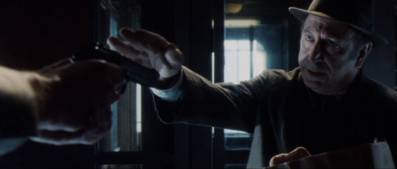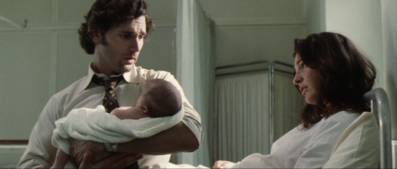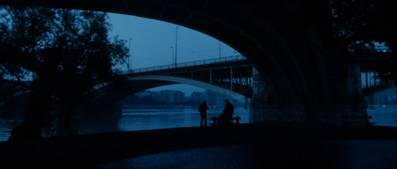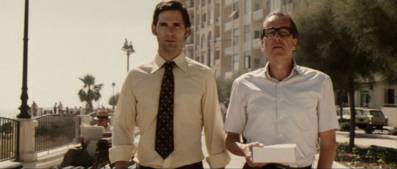| Daphna: We
should stay at home. |
| Avner: You
are the only home I ever had. |
| Daphna: [Laughs]
This is so corny. |
| Avner: What?
That took a lot for me to say! |
| Daphna: I
bet. Why did I have to marry a sentimentalist? You're
ruining my life. |
| Avner: [to
their newborn baby] Your mother's teasing me. |
German
born Israeli assassin Avner (Eric Bana), revealing
himself to be the arch-sentimentalist, Spielberg himself. |
The
DVD of Munich has an intriguing opening
that you wouldn't have found in the cinemas. Whether this
was approved by Spielberg (how could it not be?) or hastily
included after the flak got too thick from those who believed
Spielberg was hitting out at Israel and therefore condoning
Black September, it's the strangest introduction. Why? Because
it's a film-maker telling us what his film is about (at
best). At worst, it's an apology. Why make a film? To communicate,
to elicit an emotional response, to make money. But why
make a film and then feel the need to tell its audience
what its purpose is before we see it? Does John Carpenter
turn up and go "I want you to jump when the movie goes
Boo!" at the start of Halloween? Simply
for the fact that Munich does include what
are still horribly topical politics, Spielberg really should
have let his excellent movie simply and eloquently speak
for itself. Also describing the film as a prayer for peace,
is a little rich. That's a little like calling Thomas
and the Magic Railroad a rallying cry for war.
Well it was in this house.
I
was eleven in 1972 and the terrorist event of the decade
played out on live TV. Black September was a terrorist group
(we can't add the "freedom fighting organisation"
here because their ultimate goal was to wipe a country off
the map, regarding Israel as invaders of their homeland).
Their eleven members killed two Israeli athletes after breaking
into to the Munich Olympic Village. It was a terrible irony
that American athletes helped the Black September members
over the huge gates. They held nine more Israeli athletes
hostage and the next day, at a local airport, after terrible
mismanagement by local law enforcement, all nine were massacred. Munich is the story of what a country believed
was politically necessary after such an horrific event.
Israel was to show no weakness, an eye for an eye. Essentially,
here's an unlimited budget, find and kill significant enemies
of Israel. But, as Geoffrey Rush's rather oleaginous Mossad
chief, Ephraim, explains "Cut your nails and they grow
back," but his argument was that you absolutely had
to cut your nails…

Avner,
a security guard with a famous father, is chosen as the
team leader. He's a Spielbergian hero almost tailor-made.
His wife is pregnant, he believes he is doing right, gets
into the swing of it and then it all goes pear shaped as
his character arc takes him into the darkness of guilt,
the morass of perverted morality and confusion. It's been
said that Spielberg's 'message' – that killing people in
revenge makes you feel bad regardless of the cause – is
not exactly the best and most prominent spine for a film
well over two hours long. But I think that view is a little
narrow. As a movie, it has no climax (not a good thing for
a movie usually). There is no event – except for the unbelievably
silly and pointless inter-cutting between Avner fucking
his wife and flashing back to the Israeli athlete's deaths
(Nick Roeg, where are you?) – no true narrative 'wham' at
the conclusion. You're either with Avner the whole way or
the movie won't work for you. The fact that, as a human
being, you can well imagine that killing people will rot
you from the inside, doesn't deter from the film's thriller
aspects but it's not satisfying in the sense of 'having
a proper ending' is satisfying. An ending would have been
nice.
Eric
Bana is a damn fine actor. You'd have to be to pull off
being convincing as an Aussie convict (Chopper),
a Trojan Prince (Hector in Troy)
and a German born Israeli hell bent on despatching his country's
enemies over a long period of time. Bana is terrific because
he's convincing and easy to watch. The way the killings
gang up on his soul is etched carefully and methodically
in his very touching performance. The moment when he loses
it after his as yet unmet baby daughter says 'hullo' over
the phone is as true in performance terms as an actor can
get. As a father, that particular emotion is far too near
the surface to fake effortlessly. Bana does a great job.
His group are also well cast and all give solid performances,
notably Daniel Craig which bodes well for his shtick as
a spy of a more colourful and less 'Seth Efrican' nature.
Spielberg has always had the clout to surround himself with
smart people who make smart choices. It's only the inclusion
of the more obvious sub-text (is sub-text supposed to be
obvious?) that has to be laid at the director's feet. Avner,
a cook and assassin, spends his time staring at perfect
kitchens in shop windows all over the world. This is Spielberg's
metaphor for 'home', the point of all the bloodshed (the
concept of what's 'home' not an MFI kitchen). It's direction
that's on the nail, not great for sub-text. It's worth a
literal shot, Avner passing it by giving it an admiring
glimpse but not whole repeated scenes. As Mossad (the Israeli
MI6) forces amass, they start changing into women's clothing
for an assault on a terrorist cell. And what's playing on
the soundtrack being played by a band on stage nearby? "Black
Magic Woman" by Santana. Oh. It's obviousness like
this that yanks you out of the movie. If I got these connections
after ten viewings because they were subtly woven into the
fabric of the film then, terrific. But Spielberg can't resist
throwing the whole pie at you. That's OK for many but not
anymore for me.

Another
mallet-like strike of metaphor; Avner is told he has a butcher's
hands and a gentle soul. Oh, come on. Is his soul gentle
because he loves his family? Terrorists love their families.
Is his soul gentle because he looks like Eric Bana (admittedly
he looks like a gentle soul). Is his soul gentle because
he is doing wicked things for the homeland? Spielberg (and
the producers and writers) are trying to tell me that there
are many complex reasons for being a gentle soul and a cold
blooded killer. T'cha. He's a cold blooded killer regardless
of the motivation. "We are supposed to be righteous!"
says Avner's bomb maker. Duh. Avner has chosen to do these
horrible things in the name of homeland security. Hero to
many, cook to some, cold blooded killer to the (deserving?????)
few. Yes, there's a good reason for the question marks.
There
is a point to be made at an excellent piece of recurring
dialogue. Each victim is asked the same question at any
face to face assassination. "Do you know why we are
here?" It's a wonderful piece of sub-text that escaped
Spielberg's desire to make everything so obvious. "Do
you know why we are here?" serves two purposes. If
the victim acknowledges, he is admitting his guilt and therefore
giving the assassins reign to open fire. It's notable that
none of the victims acquiesced. The question's principal
purpose sub-texturally is to let the killers off the hook.
If the answer is "Yes," to the question, it's
practically an invitation to be put out of his/her misery.
No guilt for the trigger pullers. But the cumulative emotional
effect of one's actions can rarely be masked by sophistry.
Only
one person is assassinated outside the eleven names Avner
and his team are given and in many ways it's the most effective,
the most brutal, the most affecting. There is a bit of business
(and it's not whether her gown stays closed or open) that
makes the scene compelling. The 'honey-trap', the gorgeous,
sexually promiscuous girl drinking alone at an expensive
hotel, has already brought about the death of one of Avner's
team. Avner and Steve (Craig) arrive at her river house
and she knows why they are there. The desperation in her
comes off her flesh like a stench and it's that flesh –
her power – that she reveals. It's a lost and last ploy.
Shot twice and dying, she still has locomotion to comfort
a cat and sit. As she passes by Steve, he grabs her arm
and says "Where are you going?" as if she's any
threat to him now. Avner interrupts wanting another shell
for his bicycle pump gun. Steve lets her go and drops the
shells absently from his pocket. These are men at work and
the scene is so chillingly nasty (as the boys play it like
another day at the office) that it ramps the movie up a
gear. This is not a happy movie. It does not have a happy
ending. It only has any ending by virtue of it having to
stop at some point…

Roy
Scheider tells an interesting and revealing tale about Spielberg
just after the actor's extraordinary performance as Bob
Fosse's alter ego in All That Jazz, in
1979. Spielberg admired the film, says Scheider but was
overly concerned that "You're not going to make any
money, he dies in the end." Scheider had to remind
his Jaws
director that this was actually the point. That this particular
Spielberg, young audience-conscious Spielberg, could unerringly
miss the point in the no man's land between art and commerce,
is not surprising. Daddy Spielberg (why every time Spielberg
is interviewed does he insist on calling attention to his
offspring, both natural and adopted? Has he been to Politician
School P.R.?) and by definition the older Spielberg are
now both more concerned about how history will judge him
as an artist. None of that crap concerned him while he was
a kid. Adoration and big bucks did the business in those
days. After all, Steven Spielberg does not become Steven
Spielberg Inc. just because he can direct a movie. The artist
Spielberg has no one on Earth to whom he has to kowtow which
made the DVD opening of his latest re-imagining of history
all the more befuddling.
Churchill
said that history is written by the victors. Well, in the
twenty first century, history is re-written by film-makers.
There is no doubt in my mind that Spielberg's technical
skill is still intact. His command of the frame, the camera
movement and the performances all still impress. Michael
Kahn's usual invisible editing is slightly frayed, action
cuts mistimed (OK, maybe this was the point but there are
a lot of repeat action cuts to stretch out the explosions
one imagines, a style not interwoven into the whole movie)
but I do know he and Spielberg were really busting a gut
to get Munich ready for Oscar consideration.
Williams' score is restrained and effective but I wish he
and Spielberg would drop the overt 'Jewish' violin motif.
It's glutinous syrup and on meat as unpalatable as this,
it doesn't sit pretty. Yes, it's meant to invoke the lead
character's fluffy inside and hard exterior (yawn) and his
ambivalence but as that is so freakin' obvious, the score
comes across as cloying. No, where Spielberg trips up is
in his eclectic choice of project. He has become the acceptable
and questionably artistic megaphone for Jewish causes and
the only downside is that people will believe the movie
Schindler's List, (yes, I know it's based
on a true story) they'll believe the movies Saving
Private Ryan (not a true story) and Munich
and the truth of any objective history – if there is such
a thing – will disappear between the odd and even numbers
of a movie screenplay. Try finding it. That space doesn't
exist.
But
isn't that a small price to pay for raising public awareness?
Imagine the credit. Major Historical Events re-imagined
by Steven Spielberg. That's your truth, right there. Has
the price risen since the beginning of the paragraph?
It's
Spielberg. It's not going to be much less than damn near
technically perfect. In the Region 2 pressing, presented
in 2.35:1 anamorphic, Kaminski's 70s colour work is suitably
haunting and metallic. It's not just the flared trousers
and sideburns that give the period away. The sharpness and
desolate colour scheme across continents bring back the
era. Spielberg favours, in certain scenes, white out lighting,
as if his protagonists are haloed against their blinding
destinies – and if you think that sounds pretentious, you'd
be right. Solid blacks are important in this movie – good
and evil, black and light. In some scenes you half expect
his Close Encounter aliens to come scurrying
out of the over-exposures. But there's not a scratch on
it, nor should there be.

But, as I believe, sound makes
pictures and Ben Burtt's work (supervising sound editor
and designer) is exemplary. It's a Dolby Digital 5.1 mix
and the .1 (sub-woofer) gets a subtle workout. Of course, Munich features gunfire and explosions
and both are truly and crystal clearly wrenching. Even when
you know what's coming, the blast is significant. Lots of
work for the rear speakers which maintain their atmospheric
contribution throughout but more importantly there was only
one word of dialogue I could not get on first viewing (Louis
was speaking with a French accent so I had to dig around
to get it but I did in the end). A remarkably fine disc
with truly excellent sound and picture quality.
There
ought to be three newly coined names in DVD reviewers' lexicons.
Let's have a go at defining what needs names. The first
(and here's the dictionary definition):
- (noun) The first edition of a DVD, with one or more rarely
two discs which contain the bare minimum in Extras,
paving the way for the packed 'Special Edition' to
fleece fans of the film again and again.
- (noun) The term 'Special Features' meaning only an interactive
menu and scene access.
- (noun) The saccharine 'Making Of' which tells you nothing
about the actual making of the film but delights in
telling you how lovely everyone is.
So
how about suggestions for those definitions?
- A
Teaser, A Pre-Specked (Pre-Special Edition), a Miser,
A Down-Payment, a Pickpocket, a DVD-R (minus Real
Extras)...
- A
Nada, A Niente, an Emperor (no clothes).
- A Bouzereau (named after Laurent, the chap who seems
to make all the 'Makings of'), a Laurent (same reason),
a Backslapper, a Love-In.
There is a glorious spoof of No. 3 to be made. Looking
forward to it. Munich is guilty of two
of the above (1 and 3).
Munich,
The Mission, The Team is more a cripplingly
short (13 mins 12 secs) "Isn't Steven just the most
caring, lovely, sensitive human on the planet," promo.
Yes, a writer gets a look in and the actors have a line
or two but it's so "Aren't we good for caring,"
and comes across as almost a desperate plea for playground
acceptance. The Extra that should have been on this disc
(as its natural accompaniment) is the superb 1998 One
Day In September by Kevin McDonald. Luckily it's
out there on one of its own. Ever since the 'Making Of's
were homogenized, we've lost something that used to make
DVDs special…
Introduction
(apology?) by Steven Spielberg – we've gone
into that…
What
else… DVS (Descriptive
Video Service). Essentially narration for the visually
impaired.
Anything
else? Subtitles in English,
Arabic and Icelandic. Now there's a mind-fuck. I know
it's more to do with licensing territories etc. but what
a choice. Two languages spoken by the polarised west and
east and Icelandic! Cool! What else? That's your lot.
No wait. There is the wonder of the end credits and the
name of the B Camera Dolly Grip… It's Pat Garret.
Why didn't they list that as an Extra?
Excellent
movie, superbly technically presented with a paucity of
any meat save the feature, a real Pre-Specked. Spielberg
is settled into his late career phase now amassing work
he believes will secure his status as an artist. Just
a small matter. To me, the man was an artist in 1975.
All this worthy stuff is, well, just worthy, not necessarily
artistic in the way a fuck off humongous mother ship hovers
over a mountain is artistic or a bloody huge fish jumping…
I'll stop now.
|